Event Description
The Office of the Vice-Provost Indigenous Engagement at the University of Saskatchewan is looking forward to your participation in this national conference aimed to engage in meaningful discussions on the creation, implementation, and impact of Indigenous citizenship/membership verification policies and processes in post-secondary education. The conference will host keynote speakers, panels from institutions at various stages of policy and implementation development, and a workshop to conclude the two-and-a-half-day event. This event is open to ALL engaged in this work.
Registration has closed, please contact Indigenous@usask.ca to inquire about registation
Event Schedule
- 8:00 - 9:00 am: Breakfast (TCU Place)
- 9:00 am: Welcome and Opening
- 10:15 am: Reflection: Implemented Membership/Citizenship Policies in Canadian Institutions
- 12:00 pm: Lunch
- 1:00 pm: Keynote: Inuit Tapiriit Kanatami President Obed Presentation & Couch Conversation
- 2:30 pm: Break
- 3:00 pm: Governance and Nation-Building
- 4:45 pm: Closing the day
- 5:00 pm: Rest and Travel
- 6:30 pm: Networking Social at USask Campus
- Shuttles Provided
- Cultural Attire / Business Casual
- 8:00 am: Breakfast (TCU Place)
- 9:00 am: Opening remarks
- 9:30 am: Sovereignty: Indigenous Leadership Voices
- 12:15 pm: Lunch - Screening: Red Fever
- 1:30 pm: Data Security: Portal Development and Implementation
- USask IT Team
- 2:30 pm: Break
- 2:45 pm: Discussion: Successes, Challenges and Key-Learnings in Developing Indigenous Membership/Citizenship Policies
- 5:00 pm: Closing the day
- 8:30 - 9:30 am: Breakfast (TCU Place)
- 9:30 am: Welcome/Recap
- 10:00 am: Workshop Stations
- 11:30 – 1:00 pm: Lunch
- 1:30 – Continued Workshop Stations
- 4:00 – Closing Remarks
Keynote Speakers
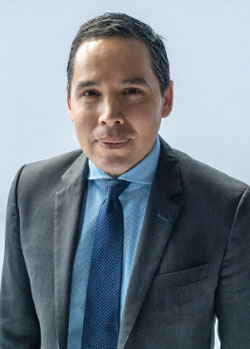
Natan Obed
President
Inuit Tapiriit Kanatami
Natan Obed is serving his third term as President of Inuit Tapiriit Kanatami, the national organization working to ensure that Inuit in Canada prosper through unity and self-determination. He is originally from Nain, Nunatsiavut, and currently lives in Ottawa. A skilled negotiator and consensus builder, Obed is the architect of the Inuit Crown Partnership Committee, a collaborative leadership table devoted to addressing the most urgent policy challenges facing Inuit, and creating conditions for Inuit to thrive.
He has devoted his career to working on behalf of Inuit. Working with Inuit Treaty Organizations, he led the development and implementation of national strategies intended to bring about transformational change in the areas of suicide prevention, research, food security and climate change, and is now forging a path to build an Inuit Nunangat University. He is a graduate of Tufts University, holds honorary degrees from Queen’s University and the University of Northern British Columbia, and is the father of two teenage boys, Panigusiq and Jushua Obed.
Panelists
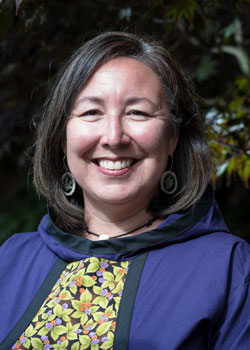
Catharyn Andersen
Vice - President
Indigenous
Memorial University
Catharyn is an Inuk from Nunatsiavut, the Inuit region in northern Labrador.
She is the Vice-President (Indigenous) at Memorial University responsible for advancing Indigenization. This position has a university-wide mandate to support Indigenous education, relationship-building with Indigenous Peoples and communities, and the success of Indigenous students across Memorial University.
Prior to working with Memorial University, Catharyn worked with the Nunatsiavut Government and the former Labrador Inuit Association in the roles of director and Inuktitut language program co-ordinator with the Torngâsok Cultural Centre in Nain, Labrador. She has also worked with the Department of Fisheries and Oceans in the Small Craft Harbours branch.
She holds a bachelor and master of arts in linguistics, and a master of business administration from Memorial University.
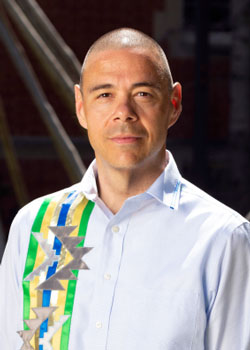
Dr. Chris Andersen
Dean
Faculty of Native Studies
University of Alberta
Chris Andersen is Michif (Métis) from the Parkland region of Saskatchewan and is currently a professor dean of the Faculty of Native Studies at the University of Alberta. Most recently, he is the lead author (with Maggie Walter, Tahu Kukutai and Chelsea Gable) of Indigenous Statistics: from data deficits to data sovereignty (Routledge Press, 2025). He has also co-edited nearly a dozen collections, among them: (with Dr. Jennifer Adese) A People and a Nation: New Directions in Contemporary Métis Studies (University of British Columbia Press); with Brendan Hokowhitu, Aileen Moreton-Robinson, Linda Smith and Steve Larkin, the Routledge Handbook of Indigenous Studies (Routledge Press); and with Nathalie Kermoal Daniels v. the Queen: In and Beyond the Courts (University of Manitoba Press). Andersen was a founding member of the Native American and Indigenous Studies Association Executive Council, was a member of Statistics Canada’s Advisory Committee on Social Conditions and was editor of the journal aboriginal policy studies for 12-year period between 2010 and 2022. In 2014 he named as a Member of the Royal Society of Canada’s inaugural cohort of the College of New Scholars, Artists and Scientists and in 2023, he was appointed a Fellow of the Program on Boundaries, Membership & Belonging, part of the Canadian Institute for Advanced Research (CIFAR).

Jessica Barlow
University of Manitoba
Jessica is a proud Red River Métis woman with deep roots in Manitoba. Jessica obtained a Bachelor of Arts Degree from the University of Manitoba and a Law Degree from the University of Manitoba, Robson Hall Faculty of Law. Jessica is a currently a lawyer in the Office of Legal Counsel at the University of Manitoba and primarily supports the Office of the Vice-President (Indigenous) and the National Centre for Truth and Reconciliation.
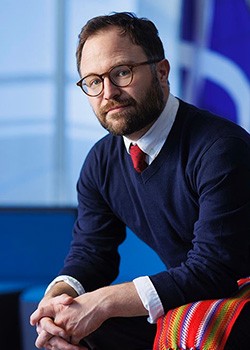
Dr. Kurtis Boyer
JSGS Research Chair in Métis Governance and Policy and Assistant Professor
University of Saskatchewan
Dr. Kurtis Boyer (Michif/Métis) is a citizen of the Métis Nation-Saskatchewan and a political scientist working in the areas of Indigenous governance and political psychology. Originally from southern Saskatchewan, he completed his PhD in Political Science from Lund University in Sweden in 2018.Dr. Boyer is currently the Johnson-Shoyama Graduate School Research Chair in Métis Governance and Policy at the University of Saskatchewan, where he is also an assistant professor. His work covers issues related to Indigenous politics, self-governance, law, and political behavior. Boyer has experience advising Métis governments on governance, constitutional reform, and legal and political analysis and has appeared before the Standing Senate Committee on Indigenous Peoples to discuss bills related to Indigenous governance.In 2024 Dr. Boyer was appointed as the first recipient of the Alphonsine Lafond – Tom Molloy Memorial Fellowship on Leadership and Innovation in Indigenous Governance, awarded by the Institute for Research on Public Policy.
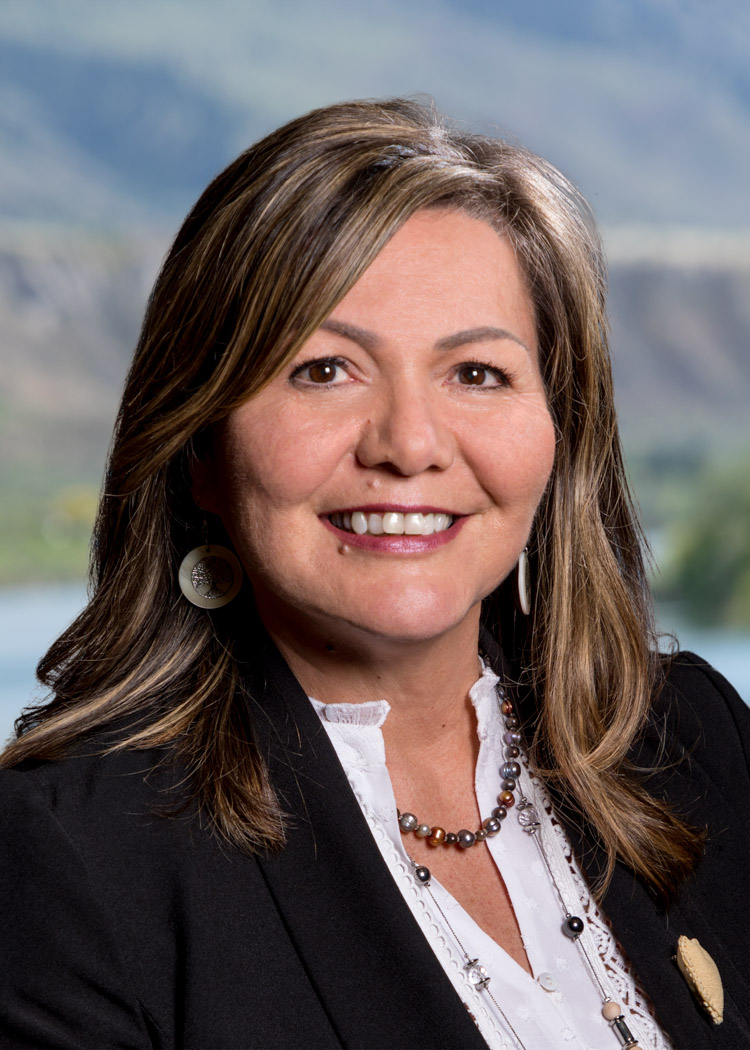
Kukwpi7 Rosanne Casimir
Kúkpi7 of the Tk’emlúps te Secwépemc
Kukwpi7 Rosanne Casimir is a proud Secwépemc woman serving her third consecutive term as Kukwpi7 (Chief) of Tḱemlúps te Secwépemc (TteS). With over 15 years of dedicated service to her community, she also holds the roles of Tribal Chief for the Shuswap Nation Tribal Council—representing nine Secwépemc communities—and Board Director for the BC Assembly of First Nations. As a mother, Key7e (grandmother), wife, and role model, Kukwpi7 Rosanne leads with strength, humility, and a deep commitment to community-driven healing, collaboration, and advocacy. She works across all levels of government to advance self-determination, economic sovereignty, and reconciliation, rooted in Secwépemc values and guided by consent-based approaches.
Her leadership has earned provincial and national recognition, including the Order of BC, BC Reconciliation Award, and a spot on Maclean’s Power List for Indigenous Affairs. Kukwpi7 Rosanne’s work has also been celebrated with numerous business and leadership awards, and her academic background spans business administration, leadership, and cultural training. She is deeply committed to building an inclusive and sustainable economy for TteS, aligning economic development with political vision to create opportunities for future generations. Holding her hands up to past, present, and future leaders, she continues to lead by example, upholding her community’s trust with integrity and pride.

William David
Director
Legal
Inuit Tapiriit Kanatami
Will is the Director of Legal Affairs at Inuit Tapiriit Kanatami. He is Mohawk from Akwesasne and has a degree from the Massachusetts Institute of Technology in Environmental Engineering Science and an LL. B from the University of Ottawa.
He has held senior positions within the Assembly of First Nations in the areas of Rights Implementation; Lands, Territories and Resources; and Economic Development, and served as Counsel for the Government of Canada.
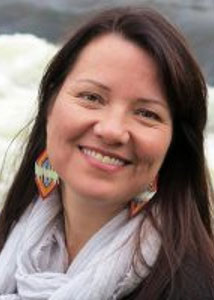
Dr. Kahente Horn - Miller
Associate Vice-President
Indigenous Teaching, Learning, and Research
Carleton University
Dr. Kahente Horn - Miller (kanien:keha'ka/Mohawk) is an Associate Professor in Indigenous Studies and the Associate Vice-President - Indigenous Teaching , Learning and Research at Carleton University. Her office supports the hiring and retention of Indigenous Faculty, promotes the development of Indigenous pedagogical tools, co-teaching models and Indigenous - focused learning spaces, and guides the Ānako Indigenous Research Institute and other research initiatives for the university. Dr. Horn-Miller is the creator of the award -winner Collaborative Indigenous Learning Bundles in response to the TRC's 94 Calls to Action. The Bundles are proving an effective model for engaging faculty, students, and staff in Indigenous/Canadian history while undoing troubled relations and opening eyes to Indigenous pedagogical practices. Dr. Horn-Miller also is a Co-Chair on the Carleton University Strategic Initiatives Committee which developed a renewed Indigenous Initiatives strategy called the Kinàmàgawin (Learning Together) Report. Her teaching practice, published writing and performance/ storytelling centers in the Haudenosaunee philosophy of feminine Mother Law, bringing further a way of engaging with the world in a relationship of respect, reciprocity and balance through ethical research, consensus-based decision making, and women centered Indigenous knowledge. She is a 2023 3M National Teaching Fellow and a recipient of the King Charles lll's Coronation Medal.
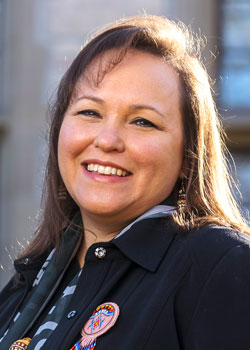
Dr. Angela Jaime
Vice-Provost, Indigenous Engagement
University of Saskatchewan
Dr. Angela M. Jaime (enrolled member of the Pit River tribe) is the Vice Provost, Indigenous Engagement and a Professor in Indigenous Studies at the University of Saskatchewan. Dr. Jaime arrived in Saskatoon July 2020 after accepting the position of the Vice Dean, Indigenous for the College of Arts and Science. Dr. Jaime spent 16 years at the University of Wyoming (Laramie, Wyoming) as Professor in and Director of Native American & Indigenous Studies and Associate Director of the School of Culture, Gender, and Social Justice. Dr. Jaime has been teaching, consulting and researching in the areas of diversity, equity, inclusion, anti-racism/anti-oppression, critical race theory, social justice and Indigenous Education for more than 25 years. Dr. Jaime completed her doctorate at Purdue University in 2005 and her master’s degree from San Francisco State University’s College of Ethnic Studies in 1997. Her areas of research are in critical race theory, Indigenous education, Native women and their experiences in higher education, and research methodology through an Indigenous and anti-racist/anti-oppression lens. She promotes social justice by critically examining systematic racism/oppression and discrimination of Indigenous people and people of color in higher education.
Most importantly, she is a mother of two amazing boys.
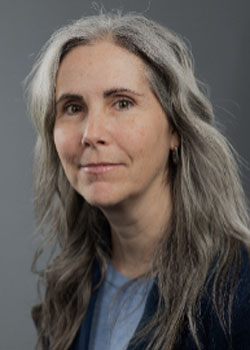
Máire McDermott
Strategic Initiatives Project Manager
University of Manitoba
Máire McDermott is the Strategic Initiatives Project Manager with the Office of the Vice-President (Indigenous) (OVPI) at the University of Manitoba. Máire is a settler to Treaty 1 territory. She grew up in Winnipeg, MB but was born in Belfast, Northern Ireland, emigrating to Canada shortly after she was born. She is a graduate of the University of Manitoba with an undergraduate degree in Human Ecology and a master’s degree in Natural Resources Management. She also has certifications in executive coaching, project management, and change management. Máire is honoured to support the meaningful work of the OVPI.
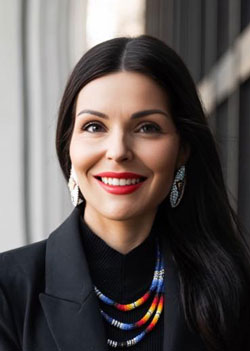
Dr. Celeste Pedri-Spade
Associate Provost
Indigenous Initiatives
McGill University
Dr. Celeste Pedri-Spade oversees McGill’s ongoing response to the 52 Calls to Action articulated by the Provost’s Task Force on Indigenous Studies and Indigenous Education. She likewise works closely with academic leaders across McGill to further define the direction of McGill’s commitment to Indigenous scholars and scholarship, and to greater representation and inclusion of Indigenous peoples within the University community. She plays a critical role in furthering efforts to ensure the success of Indigenous students at McGill, and in building meaningful and active partnerships with Indigenous communities in Quebec and across Canada.
An Ojibwe scholar and artist, Dr. Pedri-Spade is from the Lac des Mille Lacs First Nation in northwestern Ontario. She completed her PhD in visual anthropology at the University of Victoria and her MA in Culture and Communication at Royal Roads University.
Dr. Celeste Pedri-Spade is an Associate Professor in the Department of Anthropology in the Faculty of Arts. Her research interests include Indigenous art and decolonization; settler colonialism and Indigeneity; Indigenous visual/material culture; Anishinabemowin regeneration; and creative Indigenous research methodologies.
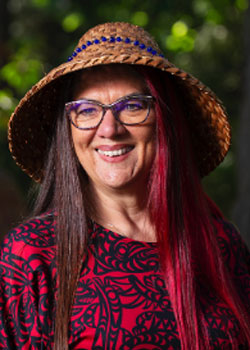
Dr. Robina Thomas
Vice - President
University of Victoria
Qwul’sih’yah’maht (Robina Thomas) is a member of Lyackson First Nation and has Snuy’ney’muxw and Sto:lo ancestry through her grandparents. Robina is currently the University of Victoria’s Vice-President, Indigenous. Robina was the inaugural director and executive director of the Office of Indigenous Academic and Community Engagement (IACE) and special advisor to the president. She is a Professor with a faculty position in the School of Social Work where she started her career at UVic as a visiting lecturer in 1998 and accepted a tenure track position in 2001. Her research focuses extensively on Indigenous women, children, residential schools, storytelling, and anti-colonial/anti-racist practices as a way of life. Her master’s thesis focused on Kuper Island Residential School and her PhD. dissertation focused on Indigenous Women and Leadership — “Protecting the Sacred Cycle: Indigenous Women and Leadership”. Robina’s accomplishments as the executive director of IACE and special advisor to the president have included:
- Leading the establishment of the Office of Indigenous Academic and Community Engagement and facilitated the release of the university’s first Indigenous Plan;
- Re-establishing the Indigenous Cultural Acumen Training program and piloting a program to pay Elders as Specialist Instructors;
- Creating space for Indigenous representation on numerous university committees.
- Co-chairing the National Building Reconciliation Forum.
Travel & Accommodations
Location: Saskatoon, Saskatchewan, Canada
Venue: TCU Place
Hotels
Booking
Book your group rate for University of Saskatchewan Room Block. You will find the information for your online reservation link below. If you have questions or need help with the link, please do not hesitate to ask.
Please ensure proper stay dates are selected to view available room types. Should results return with no availability, please advise your group contact or the hotel directly and reference group mini-code US5. Maximum number of rooms permitted to book through Reslink is three (3). To book more than three (3) rooms at one time, please contact the hotel directly by emailing reservations@sheratonsaskatoon.com or make multiple entries for groups of three.
Parking
Parking is available for $20 CAD per day, per vehicle. Be sure to register your plates at the Front Desk upon arrival.
Please Note:
Conference attendees will have until April 7th, 2025 to book a room.
Booking
Please Note:Conference attendees will have until April 11th, 2025 to book rooms at the preferred corporate group rate.
Booking
To book a reservation, please reach out to Hilton Garden Inn via our direct phone line (306 244-2311) or email (hgisaskatoon@gmail.com) and mention the Group Code: IMCC25 and your Date of Arrival"
Please Note:
Conference attendees have until April 7th, 2025 to book a room.


